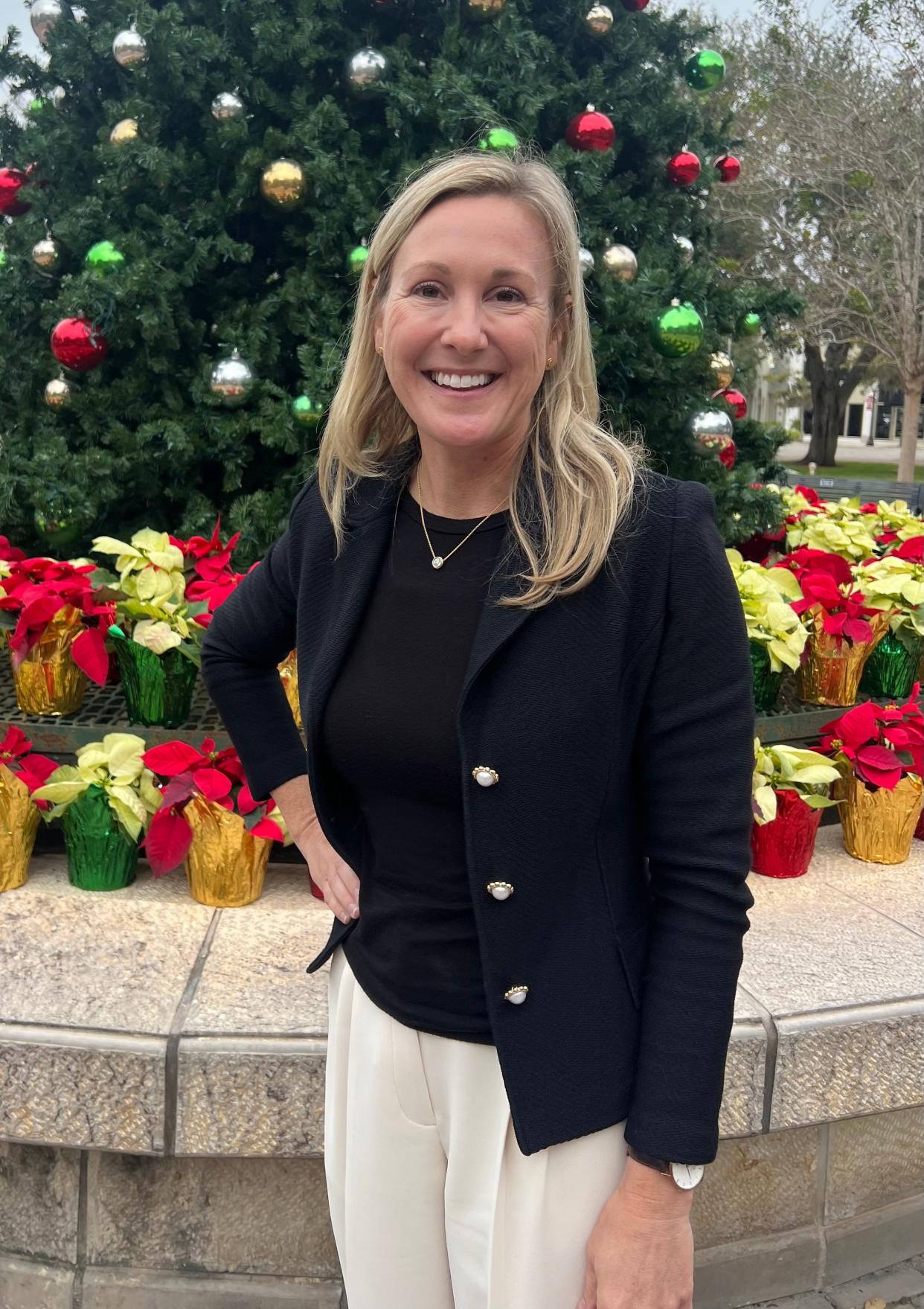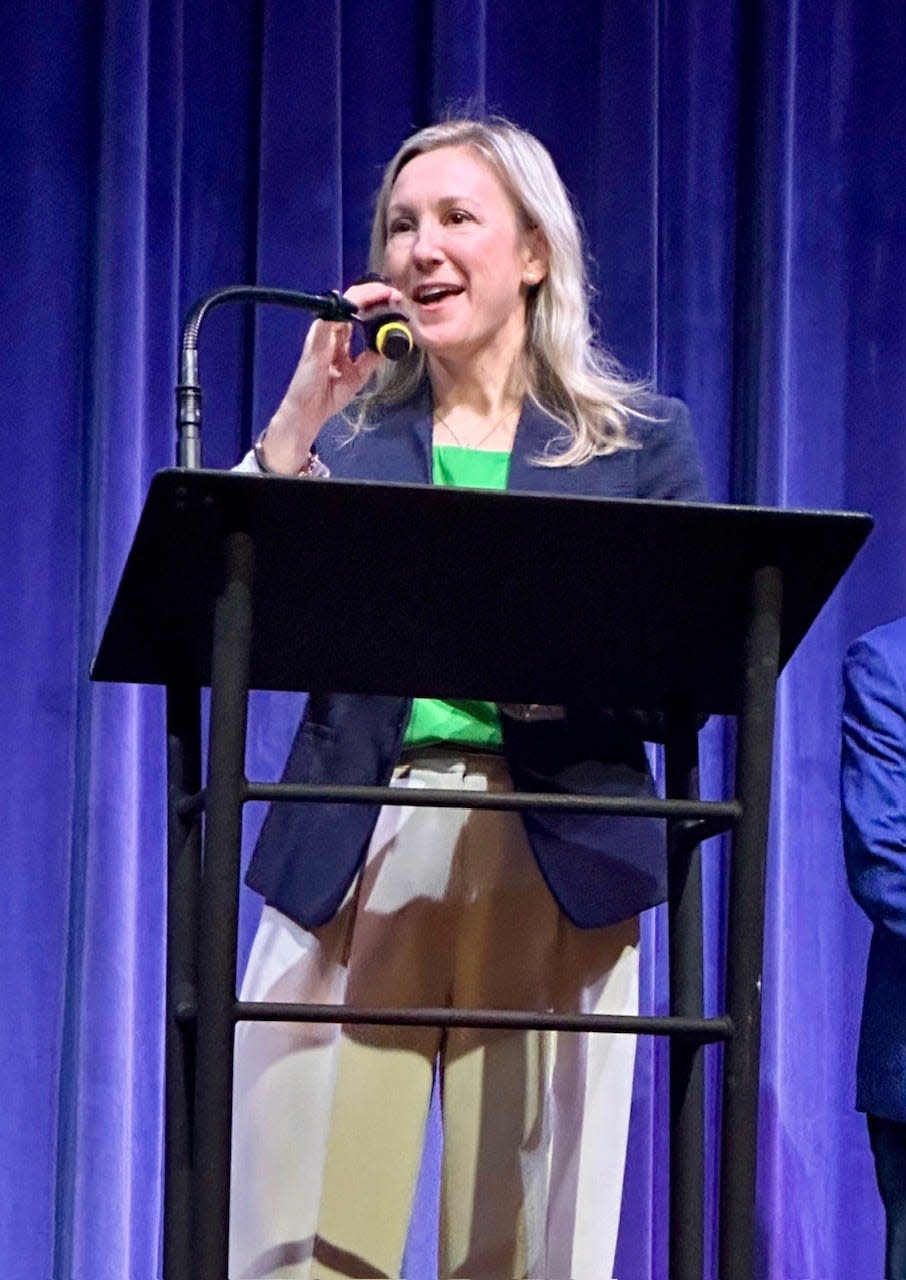'When there is a need, folks rally to it': GiveWell's leader says there's lots of goodwill

Might Santa Claus be lurking in this area under an organizational pseudonym?
A Polk County entity that’s given away a $330 million in the quarter century of its existence certainly qualifies as ho-ho-wholly generous, even if it doesn’t wear a red suit and drive a reindeer-powered sleigh.
That’s exactly what Lakeland-based GiveWell Community Foundation has achieved in the giving department over time. Just this year alone, more than 500 nonprofits in this area received upwards of $40 million. That translates to a lot of goodwill, good works and good results for the area’s charities and their clients.
Heading the organization as executive director is Callie Neslund, 39, who holds an MBA from the University of Florida and who came to the foundation from a decade-long stint at Mosaic, where she was director of public affairs and government relations.
Q. What’s the history of community foundations and how did this one come about?
A. They date to Cleveland, Ohio, in 1914 and today there are 1,800 community foundations globally – the concept being a community coming together, pooling their resources, investing those resources and over time having a sustainable impact. Community foundations are public charities – unlike private foundations – which means they are an excellent tool for the broader-base community.
GiveWell was the brainchild of a group of individuals who in 1997 came together and saw the value of this kind of community approach to philanthropy. They formed as a subsidiary of Community Foundation of Tampa Bay. A few years later, Winter Haven formed as a subsidiary and then in 2014 the two organizations merged and eventually took on the name GiveWell and extended their reach to Highlands and Hardee counties.
Q. In broad strokes, what is this foundation’s goal?
A. Our mission is to champion charitable giving in order to improve the quality of life in the areas we serve both now and for future generations, and I think that's what really sets us apart. We are an institution of permanence and sustainability. We hold a number of endowments that will outlast me or you or anybody who's currently here, so we are very much playing the long game in looking after our community.
Q. Before becoming its head, had you been involved in the foundation?
A. In a previous life, I worked in corporate philanthropy and we had a few community projects where we partnered with GiveWell, one of which was a playground. We wanted to make sure that funds were set aside to maintain and update the playground for many years to come.
And then my husband and I opened a fund. As young working professionals trying to raise a family, we wanted to be more charitably minded but didn't necessarily have the bandwidth to do so at that moment and so we decided to open a donor-advised fund that we can give to and then we can be really intentional later and allow it to grow in the meantime.
'You can't explain': Lakeland man treated the wounded in Vietnam, and his own trauma
Q. Just what is a donor-advised fund?
A. A donor-advised fund is probably the most popular and most flexible giving vehicle in the United States right now. With a donation of $10,000 or more anyone can open a donor-advised fund at GiveWell, select the investment strategy for it to grow over time, take their tax deduction at the moment that they make that initial donation and then advise on grants.
Once a donation is given to GiveWell it becomes an asset of the foundation but donors retain the ability to advise on the nonprofits that they would like grants to go to, provided they meet our due diligence tests.
Q. And what are those tests?
A. The criteria is to be a 501(c)(3) in good standing with the IRS, and that is a big piece of the due diligence that that we do – looking at organizations and their accountability structure – how are they planning to use the funds, making sure they are not hate organizations, and then following up with reporting. We are more knowledgeable about those issues than individuals on the outside.
The vast majority of our grants, about 82%, are within our service area – Polk, Hardee and Highlands – which is a huge point of pride. That's kind of our competitive advantage, that local knowledge of who the players are, but it's not restrictive in the sense that our donor-advised fund holders can grant to organizations outside of the area as well.
Q. What are some of the other types of funds?
A. We hold about 90 agency funds, and by agency I mean nonprofits, which either have a “savings account” if you will or an endowment and they choose to partner with GiveWell because we have the expertise to invest and manage and to do the backend office support as well. A big part of our community service is serving nonprofits.
It also allows us constant communication with them to know what's going on, giving insight into the health of the organization, knowing what their needs are as well. We've really leaned into that role of philanthropic matchmaker and knowing where and when there are urgent but unexpected needs.
Field of Interest funds are a great way for someone to support a cause they care about – say education, health care or animal welfare – while allowing GWCF’s Grants Committee to vet and select the ultimate recipients.
Lastly, we hold a number of memorial funds designed to honor loved ones by supporting causes or nonprofits which would have been meaningful to that person. These are often supported in lieu of flowers when someone passes.

Q. How does one go about setting up a fund?
A. It is relatively easy by design. Our fund agreements are a few pages and the thing that really takes some thought is naming a fund but also thinking about who is going to advise on grants and charities as well as investment strategy.
There's some pre-work but otherwise it's fairly simple and then our fund holder portal I liken to a bill pay portal – it's pretty user friendly and available 24/7 and you can see various needs that exist in the community that we're aware of and kind of select one of those or search any nonprofit by their name.
Q. Are fund-holders required to comingle their funds for investment purposes?
A. We have three pools available for those who want to participate in our pools – long term, balanced and conservative. But some folks love their financial adviser and have been with them for a long time, and so for those who have funds of over $1,000,000, they have the option of keeping their financial adviser in what's called an individually managed account, so long as the portfolio is consistent with our investment policy statement.
Q. Is the foundation obliged to operate under any kind of institutional oversight?
A. We are accredited through the Community Foundation National Standards. They reinforce integrity, professionalism and legal compliance in our industry. It’s a very rigorous process that looks at our policies and our asset management. What is encouraging is within the community foundation world there's a lot of best practices and sharing and learning from each other, which coming from a corporate environment you didn't have a lot of that. Everything there is proprietary, but community foundations generally are separated geographically, and so they're not competing with each other per se.
Q. In terms of how money is collected and spent on charitable activities, United Way has sometimes been described as the checking account of charitable giving while GiveWell more closely resembles the savings account. How do the two organizations mesh?
A. United Way is a very valued partner even though we have two very different business models. The collaboration with them on the United Community Relief Fund that was established as a result of COVID to provide nonprofits with support during those difficult times was valuable in itself and the infrastructure that we created worked really well so we left that intact for future needs of the community.
Together we conducted what we called the United Community Needs Assessment, a multiyear effort across all three counties to gather data about what some of our resources are that we have and what some of our greatest needs are, and it provides the opportunity for the community at large to be informed with data about where we should direct future resources.
'It's keeping us young': Winter Haven grove finds niche selling organic lemons
Q. What stood out in this study?
A. One of the big themes was around lack of quality childcare and kindergarten readiness. So you have organizations like the YMCA that has such a strong track record of serving families with quality programming that as they prepare for a capital campaign it makes it really easy to say, oh yeah, here's the data that supports your effort to expand. So we’re not starting from scratch. We're just trying to scale some of our existing programs that have been really successful.
We've had a 20% increase in population in the last 10 years with another 20% expected in the next 10, and that touches every area from your infrastructure and your roads to your schools and your emergency capacity.
Another glaring need for our area is access to behavioral health providers. In 2021, the population to mental health care providers in Polk was 1,190 to 1, compared with the national benchmark of 310 to 1. This finding underscores the need for graduate medical programs and other efforts to draw providers to the area.
Q. Do you think it possible to grant your way out of some of these problems?
A. It's not necessarily granting our way out of some of these challenges, and the philanthropic sector isn't always the only one that can bring solutions, but we are the one that can kind of bring everybody to the table to talk about it. We're hoping that the needs assessment and the conversation around it spur some of those discussions here because we haven't cornered the market on good ideas by any means.
Q. What are you most proud of in your role and the foundation’s role in the community?
A. I'm increasingly proud of our community’s generosity. When there is a need, folks rally to it. I believe wholeheartedly that we have one of the most generous communities anywhere in the country. The tone and the culture that has been set by those before us we're working hard to continue. Giving can be fun, so it’s great to see folks get excited about supporting our nonprofits and having a good time doing so.
This article originally appeared on The Ledger: After a $40M year, GiveWell's leader says there's lots of goodwill

